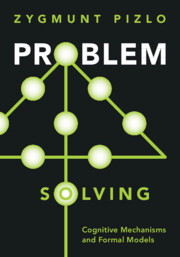Book contents
- Problem Solving
- Problem Solving
- Copyright page
- Dedication
- Contents
- Figures
- Tables
- Preface
- Chapter 1 Problem Solving
- Chapter 2 Animal Problem Solving
- Chapter 3 Modern Research on the Human Ability to Solve Problems that Have Large Search Spaces
- Chapter 4 The Exponential Pyramid Representation that Compensates for Exponentially Large Problem Spaces
- Chapter 5 Heuristic Function, Distance, and Direction in Solving Problems
- Chapter 6 Insight and Creative Thinking
- Chapter 7 Inference in Perception
- Chapter 8 Cognitive Inferences, Mental Representations
- Chapter 9 Theory of Mind
- Chapter 10 Solving Problems in Physics and Mathematics
- Chapter 11 Summary and Conclusions
- References
- Index
Chapter 9 - Theory of Mind
Published online by Cambridge University Press: 23 June 2022
- Problem Solving
- Problem Solving
- Copyright page
- Dedication
- Contents
- Figures
- Tables
- Preface
- Chapter 1 Problem Solving
- Chapter 2 Animal Problem Solving
- Chapter 3 Modern Research on the Human Ability to Solve Problems that Have Large Search Spaces
- Chapter 4 The Exponential Pyramid Representation that Compensates for Exponentially Large Problem Spaces
- Chapter 5 Heuristic Function, Distance, and Direction in Solving Problems
- Chapter 6 Insight and Creative Thinking
- Chapter 7 Inference in Perception
- Chapter 8 Cognitive Inferences, Mental Representations
- Chapter 9 Theory of Mind
- Chapter 10 Solving Problems in Physics and Mathematics
- Chapter 11 Summary and Conclusions
- References
- Index
Summary
By now we all know how important mental representations are for any goal-directed actions. But, if I have my mental representations and you have yours, can I improve my actions by having a representation of your representation? If I have such a representation, I am able to acknowledge that you are like me, in the sense that you have your own mental representations and goal-directed actions. This dialogue is referred to as the Theory of Mind because I have a “theory” (a model or representation) of your mind. In fact, I may even have a representation of your representation of my representations. These kinds of first-order and second-order representations are important in evaluating false beliefs and deception. The simpler types of reasoning are already present in preschool children, as illustrated in the first study described in this chapter. More complex types of reasoning show up later in development, so adults can use them. Forming representations of others’ representations happens in visual perception, as well, where it is called “visual perspective taking.” Children are capable of reasoning about what other people can or cannot see and they can make these visual inferences not only by looking at a 3D scene, but also by looking at pictures of 3D scenes. The second half of this chapter describes in some detail a systematic, quantitative study of a matrix game that has been used to examine levels of recursive resoning.
- Type
- Chapter
- Information
- Problem SolvingCognitive Mechanisms and Formal Models, pp. 146 - 154Publisher: Cambridge University PressPrint publication year: 2022

